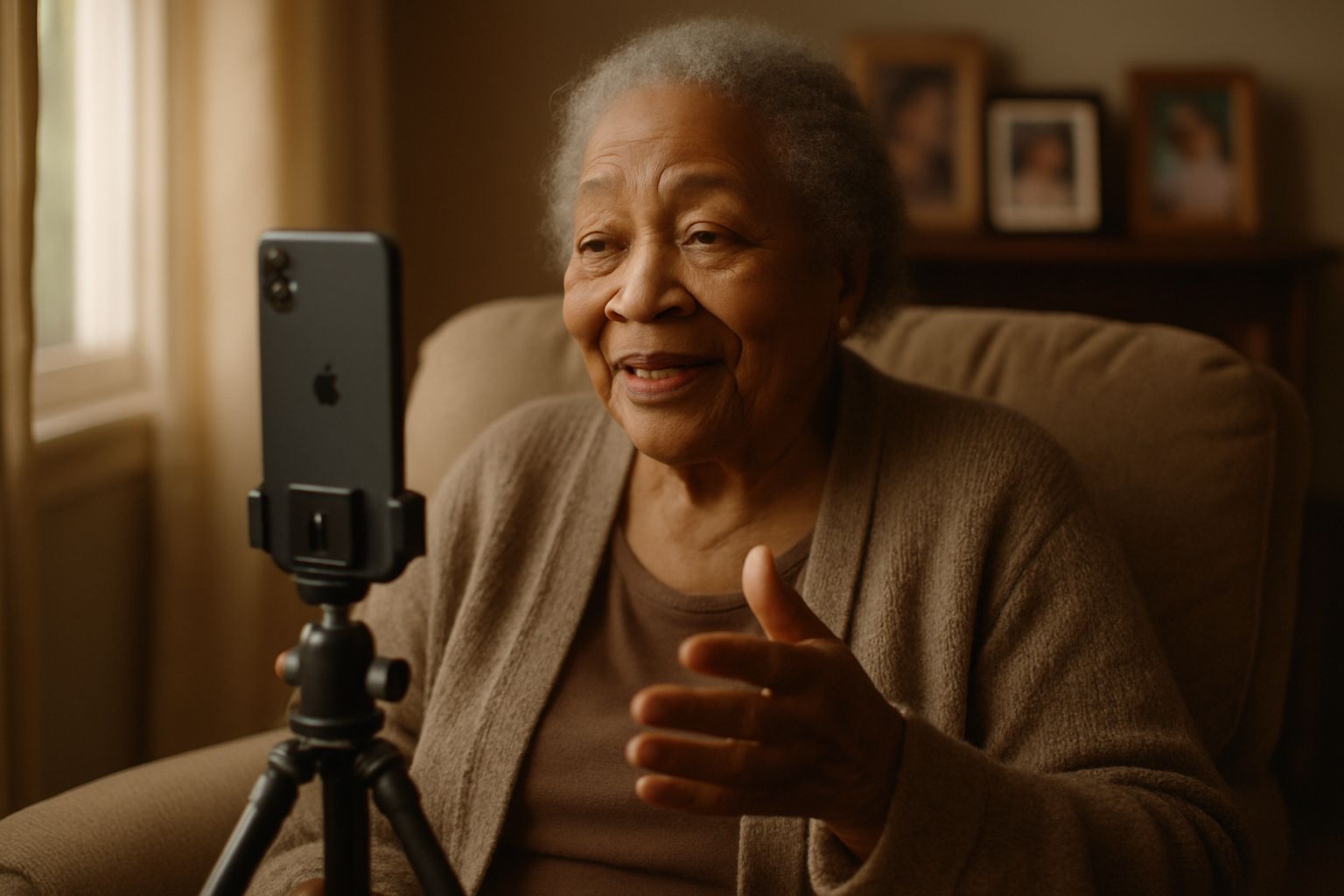Table of Contents
Let's be honest—when you read that question, did you feel a little knot in your stomach? Maybe you thought, "What life lessons? Who says I have anything worth sharing?" Or perhaps, "Even if I did, would anyone care?"
You're not alone. This discomfort is so common it's practically universal. But here's the thing: every single person who has made it to midlife and beyond has accumulated wisdom that someone, somewhere, needs to hear. Yes, even you. Especially you.
The Stories We Tell Ourselves (And Don't Tell Others)

Margaret's Hesitation (Baby Boomer, 68)
Margaret sat at her kitchen table, staring at the blank journal her daughter had given her for Christmas. "For your stories, Mom," Jessica had said. That was three months ago. The journal remained pristine, its pages as unmarked as fresh snow.
"What stories?" Margaret muttered to herself. She'd been a nurse for 35 years, raised three kids, survived a divorce, and rebuilt her life at 52. But somehow, none of that felt like "wisdom" worth recording. It just felt like... life.
It wasn't until her grandson asked her about a photo from her nursing school graduation that things shifted. "Grandma, were you scared?" he asked. She found herself telling him about being one of only three Japanese women in her class, about the patient who changed her perspective on dignity, about the night she saved a life by trusting her instincts when the monitors said everything was fine.
"You should write that down," he said, eyes wide. And suddenly, Margaret understood. Her lessons weren't in grand philosophical statements. They were in the small moments of courage, the lessons learned in hospital corridors, the strength found in starting over.
David's Digital Dilemma (Gen X, 51)
David considered himself pretty tech-savvy, but when his 16-year-old daughter asked him to "just make a TikTok" about his job as a carpenter, he laughed it off. "Nobody wants to see your old man on TikTok, Sophia."
But the question nagged at him. His father had been a carpenter too, old school, and David wished he had even one video of his dad explaining how to read wood grain or why he always kept three pencils behind his ear. His father's hands had built half the custom homes in their Connecticut town, but all that knowledge had died with him five years ago.
David didn't make a TikTok. Instead, he started recording simple videos on his phone—how to fix a squeaky floorboard, why measuring twice really does matter, the story behind the scar on his left thumb. Not life-changing philosophy, just... life. The things his kids might need someday when he's not around to ask.

What’s Your PTQ Preparedness Score?
The "Will They Even Care?" Question
Here's what we know: they will care, just maybe not when you expect them to.
Your 15-year-old might roll their eyes when you share the story of your first job. But at 30, facing their own career crisis, they'll remember what you said about starting over. Your grandson might seem distracted when you talk about your parents' immigration story. But someday, when someone questions his belonging, your words will become his armor.
In some cultures, this transfer of wisdom is built into the fabric of daily life. In many Latino families, consejos (advice/life lessons) are shared over dinner preparation. In African American communities, stories of resilience are woven into Sunday dinners. In Asian families, lessons often come wrapped in proverbs shared during tea.
But in our increasingly fragmented, digital world, these natural moments of transfer are becoming rarer. We have to be more intentional.
Tom's Unexpected Audience (Baby Boomer, 71)
Tom had always been the quiet one. Retired from his accounting firm, he figured his knowledge of tax codes and spreadsheets would die with him—and good riddance. But when he mentioned to his daughter that he'd helped integrate his firm's offices in 1974, she stopped cold.
"Wait, what? Dad, you were part of that?"
Tom had never thought of it as a story worth telling. But his experience as one of the first to push for hiring Black accountants at his firm, the resistance he faced, the small victories—suddenly, his daughter saw him differently. His granddaughter, a junior in college studying business, asked if he'd do a Zoom call with her diversity in business class.
"I'm just an old numbers guy," Tom protested.
"No, Grandpa," she replied. "You're a history lesson I can actually talk to."
Life Lessons Come in All Shapes
Your life lessons don't have to be profound philosophical truths. They can be:
Practical wisdom: How to read people in a business meeting, how to know when bread dough is properly kneaded, how to apologize and mean it.
Survival stories: How you made it through the 2008 recession, how you navigated single parenthood, how you rebuilt after loss.
Cultural knowledge: Family recipes with the stories behind them, traditions, and why they matter, the history that textbooks don't teach.
Professional insights: The unwritten rules of your industry, how to find mentors, when to take risks.
Relationship wisdom: What makes a marriage last (or when to leave), how to maintain friendships across decades, how to forgive but not forget.
Values in action: Not just what you believe, but stories of when those beliefs were tested.
Making It Happen: From Intention to Action
The hardest part isn't having something to share—it's starting. Here's how to break through:
Start small. Pick one story, one lesson, one piece of advice. Don't try to download your entire life experience in one sitting.
Choose your medium based on your comfort, not theirs. Yes, your grandkids live on social media, but if you're more comfortable writing letters, write letters. They can be digitized later.
Make it routine. Every Sunday, record one five-minute video. Every month, write about one life lesson. Small, consistent efforts add up.
Include the failures. Your mistakes and what you learned from them are often more valuable than your successes.
Be specific. Instead of "work hard," share the story of the time working hard didn't pay off and what you learned. Instead of "be kind," tell about the moment someone's kindness changed your trajectory.
Your Personal Legacy Toolkit
We've created three downloadable resources to help you start this journey:
1. Life Lessons Inventory Worksheet
Prompts to help identify your unique wisdom
Categories: Professional, Personal, Relationships, Survival, Cultural
Questions that dig beneath the surface
Space to note which stories go with which lessons

Life Lessons Inventory Worksheet.pdf
Life Lessons Inventory Worksheet (Most comprehensive) Life chapter mapping to identify when lessons were learned Five wisdom categories with specific prompts Story structure templates to expand on top lessons Quick wisdom exercises for bite-sized insights Letters to the future section Action planning to ensure follow-through
106.86 KB • PDF File
2. Video/Audio Recording Guide
Technical basics (you don't need fancy equipment)
Conversation starters and prompts
How to structure your stories for impact
Tips for overcoming camera shyness
Storage and sharing recommendations

Video_Audio Recording Guide.pdf
Video/Audio Recording Guide (Most practical) Simple technical setup that demystifies recording Conversation starters for different comfort levels Specific prompts for Baby Boomers vs Gen X Tips for overcoming camera shyness Storage and sharing recommendations First recording checklist to eliminate barriers
169.81 KB • PDF File
3. Family Interview Guide
Questions to ask yourself first
How to make it a conversation, not an interrogation
Age-appropriate approaches for different generations
Creating safe spaces for difficult topics
Preserving stories from elder family members

Family Interview Guide.pdf
Family Interview Guide (Most thorough) Self-reflection questions to prepare the interviewer Age-appropriate approaches for different generations Extensive question bank organized by life themes Techniques for handling emotions and difficult topics Special situation guides (memory issues, long-distance, groups) Multiple project timeline options
309.06 KB • PDF File

The Time Is Now (Really)
If you're a Baby Boomer, you've lived through the Civil Rights era, Vietnam, Watergate, the Cold War's end, 9/11, the digital revolution, and a global pandemic. You've seen the world transform multiple times over.
If you're Gen X, you're the bridge generation—analog childhood, digital adulthood. You know what it was like before and after. You've adapted to more change than any generation before you. Shoot, would you still drink from the water hose now?
Both generations have wisdom that can't be Googled. Your experiences, your failures, your small victories, your daily courage—these are the inheritance you can leave that no stock market crash can erase.
Margaret filled her journal—not with grand wisdom, but with stories. David has 47 videos on his phone now, waiting for the right time. Tom is writing his memoir, one spreadsheet story at a time.
Your life lessons—all of them, the beautiful and the broken—are worth preserving. Someone needs to hear them. Maybe not today, maybe not tomorrow, but someday, at exactly the right moment, your words will matter more than you can imagine.
So, Pardon the Question, but: How will you share your life lessons and values with future generations?
The blank page is waiting. The record button is ready. Your stories—messy, imperfect, absolutely necessary—are the legacy no one else can leave.
Start with just one. We promise it's enough.
Next Issue: "The Financial Files - What Documents Do Your Loved Ones Really Need?"
Have a story about sharing (or receiving) life wisdom? We'd love to hear it. Reply to this email with your experience.

Order “The Deck” for friends, family, colleagues here: Coming Soon
